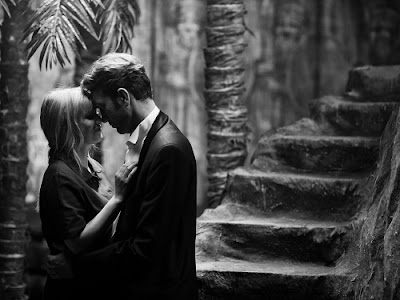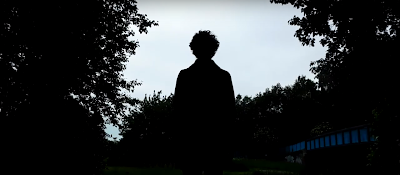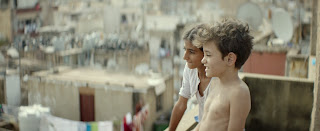Cold War
Cold War - Two Hearts and Four Eyes
The Cold War - a period that marked the second half of the 20th century and the history of humanity forever. A war, yet not a war. A conflict, yet not a conflict. A contradiction. This is brilliantly transported to the romance that we witness in this beautiful film about the intermittent love affair between a pianist and a singer, who have different backgrounds and temperaments, mismatched in a divided Europe. A passionate romance afflicted by separation. We are dazzled by the slick black-and-white visuals of Pawel Pawlikowski's stunning vision of this romantic life, with extreme feelings, ranging from the fiercest passion to the deepest depression, loosely based on and dedicated to his parents. This is a picture to fall in love with. This is a picture about two hearts and four eyes longing to be together when they cannot. This is a timeless romance.
Folk music is the start of this romance. We see a group of researchers record folk songs across Poland. One of these researchers is Wiktor, a pianist and our male protagonist - portrayed by Tomasz Kot, in one of the most incredible performances of the year. In this first part, we are shown the spirit of the Polish People through these folk songs - after all, folk culture is the best portrayal of a culture, having the longing, the suffering and the passion of the People strongly present in it. The objective of this research is to create a performance company that will enact this music on the stages of Poland and other countries of the Eastern Bloc as a way to reanimate Polish identity - we mustn't forget that Poland was a "communist country" at this time. In this company, the romance blossoms. Zula, a peasant girl with a musical talent in her voice, big ambitions, and a personality, catches Wiktor'ss attention during her audition. There's something in her - a spirit, an audacity, an unapologetic-ness, an energy, an originality. She's played by Joanna Kulig, and her performance stands out from anything I've watched this year, with a nuanced, layered and vulnerable performance like nothing else. She perfectly embodies Zula's unrestraint. She has been compared to Jeanne Moreau, and with very good reason. It's not just Zula that stands out to Wiktor, it's also Joanna Kulig that stands out to us with such a brilliant performance.
After this first encounter between Wiktor and Zula, a romance that spans both time and geography is born. The romance spans the 50's and the 60's and stretches all through Europe, from Poland to Berlin, to Paris, and to Yugoslavia. In a divided Europe, this romance stands to defy it, ignoring borders and time - because love is superior to these things.
However, this romance also has its divisions. This is the "contradiction" part. Like Europe is separated, this romance has intermissions. Over the years, the couple gets separated and reunited. They are, in a way, mismatched - but isn't that the nature of most romances? One is impulsive and passionate; the other is cold and contained. This is perfectly shown in a brilliant scene - with such amazing camera movements - where Zula dances with various men in a bar and, eventually, on the bar's counter, taken away by Bill Haley's Rock Around the Clock, while Wiktor sits at the counter with a look of disapproval. Or when Zula gets angry with Wiktor's "bourgeois" behavior and jumps into a river and floats away while singing (I loved this scene so much, I just had to mention it).
The moment of the greatest divide between the two is when they are together in Paris, in a foreign country. When they are there they work on releasing a record of translated Polish folk songs. The problem is that these songs lose their spirit when translated. "The lyrics don't fit the melody", Zula complains. The French translation is too intellectual, filled with unnecessary and pretentious metaphors (it's French), while the original Polish was simple and authentic, expressing the raw feelings of the Polish People. This emotion is lost in translation. Something similar happens to the relationship between Wiktor and Zula when they are in Paris. "In Poland, you were a man", she criticizes. Just like the songs are spiritless in French, their romance loses its passion in Paris.
But, just like Humphrey Bogart and Ingrid Bergman would always have Paris in Casablanca, they'll always have Poland. And so, we are taken to a bittersweet, moving and ambiguous reunion and ending that will make you think about it for a long while - I'm still thinking about it, trying to figure out what it means. But is it really something to be thought about? To be intellectualized? Or, is it something just to be felt?
One important aspect to note in this Pawlikowski's masterpiece is the power of suggestion present in it. A lot isn't shown, and the end is powerful and beautiful precisely because of this. We are left to wonder and put the pieces together. This is a relatively short film (only 88 minutes), with such concentrated emotions, which perhaps reflects the fleetingness of life and the intensity of love. Because of this, a lot is left out from us - and this is what makes this romance so much more compelling, enigmatic, and addictive.
With a completely unforgettable soundtrack and perfect cinematography, this is one of the cinematic masterpieces of this year. You will fall in love with Wiktor and Zula as much as they did with each other. This is a timeless romance set to become a timeless classic. You will most definitely be smitten by Dwa Serduszka (Two Hearts). After all, we are all one heart longing to find that other heart that will beat together with our own forever.




Comments
Post a Comment